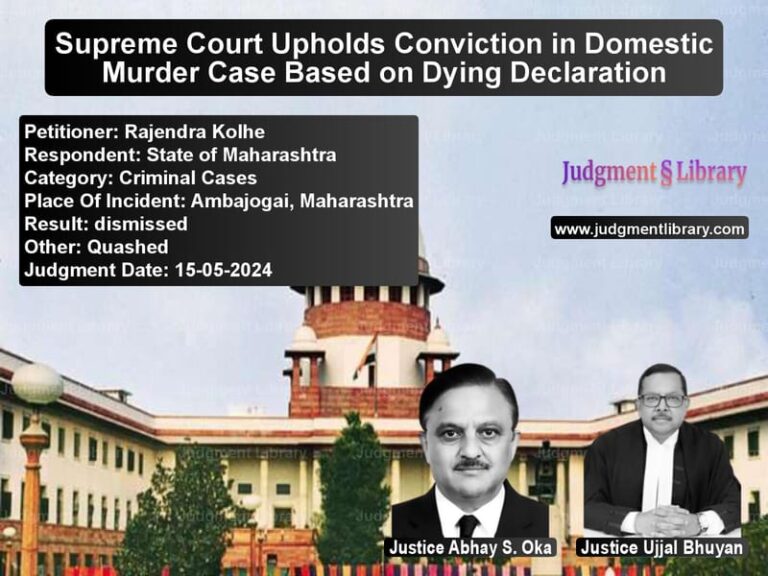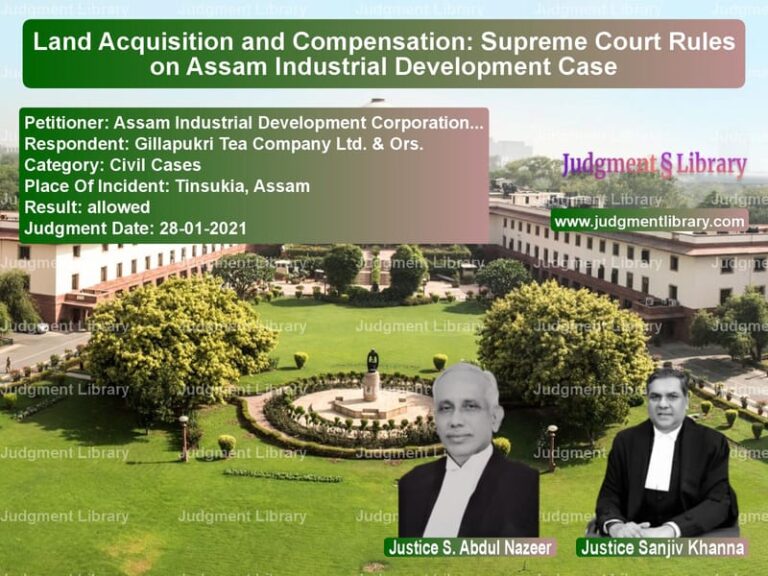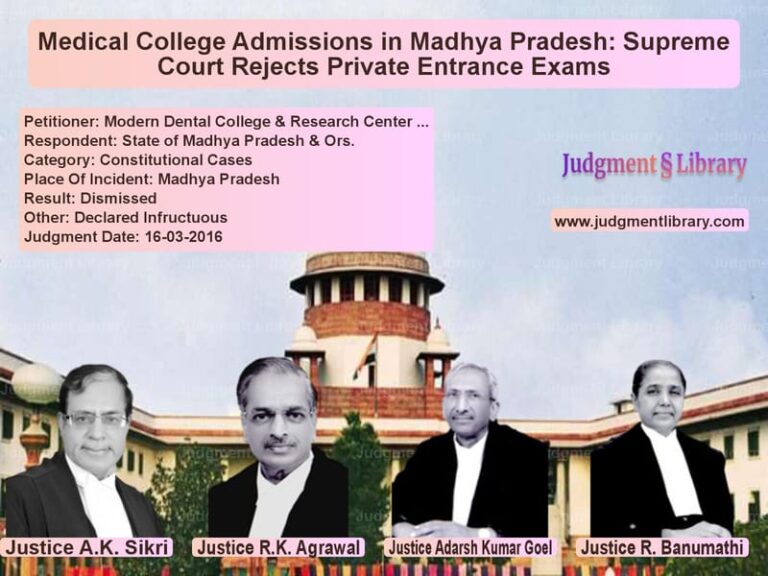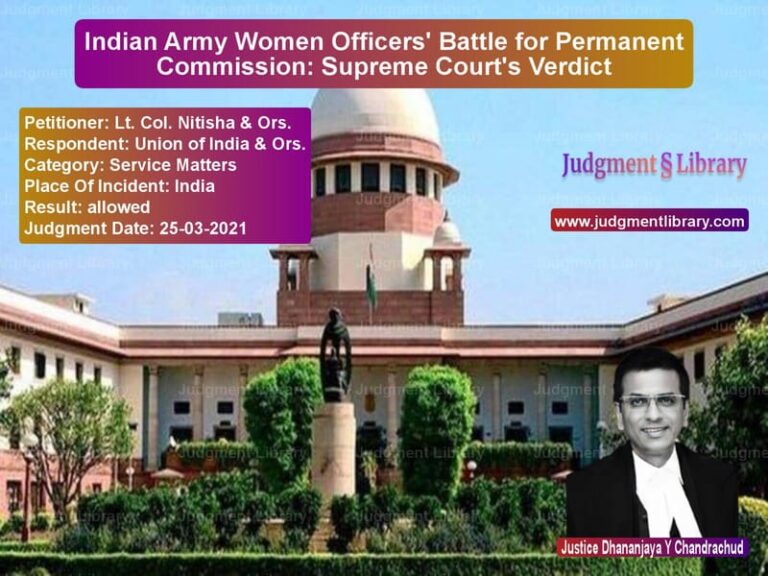Factories Act Violation: Supreme Court Reinstates Criminal Case Against Laundry Business
The Supreme Court of India has recently ruled in favor of the appellants in the case of The State of Goa & Anr. v. Namita Tripathi, concerning the applicability of the Factories Act, 1948, to a commercial laundry business. The case arose after the respondent was accused of running a factory without proper approvals and licenses. The High Court of Bombay at Goa had earlier quashed the criminal proceedings initiated against the respondent, ruling that dry cleaning and laundry services do not constitute a ‘manufacturing process’ under the Factories Act. However, the Supreme Court overturned this decision, restoring the criminal proceedings.
Background of the Case
The dispute began when an inspection was conducted on May 20, 2019, at the respondent’s commercial laundry premises, known as ‘White Cloud.’ The inspection revealed the following alleged violations:
- The respondent lacked factory-approved plans, violating Rule 3 of the Goa Factories Rules, 1985.
- The respondent was operating without a valid factory license, in violation of Rule 4 of the Rules read with Section 6 of the Factories Act, 1948.
- More than nine workers were found employed at the premises, exceeding the threshold for classification as a factory under Section 2(m)(i) of the Factories Act.
- No muster roll was maintained for May 2019.
- The process of cleaning and washing clothes was carried out using machinery.
Based on these findings, the Factory Inspectorate warned the respondent to comply with the Act, failing which legal action would be initiated. Despite repeated notices, the respondent did not take corrective action, leading to the filing of a complaint under Section 92 of the Factories Act.
High Court Proceedings
The respondent challenged the criminal proceedings before the High Court of Bombay at Goa, arguing that:
- The order issuing process was unreasoned and lacked application of mind.
- The nature of business (dry cleaning and laundry) does not constitute a ‘manufacturing process’ under the Factories Act.
- The business was a service industry, not a manufacturing unit.
The High Court accepted these arguments and quashed the criminal proceedings, ruling:
“Dry cleaning is not within the definition of manufacturing process. To constitute manufacture, there must be a transformation where a new marketable commodity comes into being. Mere labor bestowed on an article does not make it manufacture unless the product becomes commercially known as another distinct article.”
Supreme Court’s Analysis and Judgment
Arguments of the Appellants (State of Goa)
- The appellants argued that the Factories Act, 1948, is a welfare legislation designed to regulate working conditions in premises where manufacturing processes are conducted.
- The definition of ‘manufacturing process’ under Section 2(k) of the Factories Act explicitly includes ‘washing’ and ‘cleaning’ activities.
- The respondent’s business involved washing and cleaning articles using power and employed more than 9 workers, bringing it squarely under the definition of a factory under Section 2(m).
- The High Court erred by importing principles from the Central Excise Act, which define ‘manufacturing’ differently.
Arguments of the Respondent
- The respondent contended that laundry and dry cleaning services do not involve manufacturing in the traditional sense.
- They argued that a manufacturing process must result in a new, marketable product, which was not the case here.
- Reliance was placed on earlier judgments that interpreted ‘manufacturing process’ narrowly.
- The respondent also contended that the process issuing the criminal complaint was improper and lacked reasoning.
Supreme Court’s Findings
- The Supreme Court held that the Factories Act must be interpreted in a manner that aligns with its objective of ensuring worker safety and welfare.
- The Court noted that Section 2(k) clearly includes ‘washing’ and ‘cleaning’ as part of the definition of a ‘manufacturing process.’
- The Court ruled that there was no requirement that a ‘new product’ must emerge for an activity to be classified as a manufacturing process.
- The High Court wrongly relied on the definition of ‘manufacture’ from the Central Excise Act, which does not apply to the Factories Act.
- The Supreme Court emphasized the welfare intent behind the Factories Act and ruled that the business in question fell within its purview.
Verbatim Observations of the Court
The Court stated:
“The definition of ‘manufacturing process’ under Section 2(k) of the Factories Act includes ‘washing’ and ‘cleaning’ of any article with a view to its use, sale, transport, or disposal. The respondent’s business clearly involves washing and cleaning with the aid of power and employment of more than 9 workers, thus meeting the statutory criteria for a factory.”
The Court also addressed the argument regarding the need for transformation, stating:
“There is no requirement under the Factories Act that a ‘new’ product must emerge for an activity to be classified as a manufacturing process. The High Court’s interpretation was erroneous and contrary to the express statutory language.”
Final Verdict
Based on its analysis, the Supreme Court allowed the appeal and restored the criminal proceedings, holding:
“For the reasons set out hereinabove, we allow the appeal and set aside the order of the High Court. The complaint filed by the appellants along with the order issuing process shall be proceeded with in accordance with law.”
Implications of the Judgment
This ruling has significant implications:
- It reaffirms that laundry and dry cleaning businesses that employ more than the statutory threshold and use power fall within the scope of the Factories Act.
- Businesses engaged in similar activities must comply with the licensing and safety requirements under the Factories Act.
- The judgment clarifies that the Factories Act should be interpreted in a manner that promotes worker welfare rather than adopting restrictive definitions.
Conclusion
The Supreme Court’s judgment in this case sets an important precedent in labor and industrial law. It underscores the broad scope of the Factories Act, ensuring that enterprises engaged in substantial industrial activity comply with labor regulations. This ruling will likely influence future cases involving the definition of manufacturing processes under labor laws.
Petitioner Name: The State of Goa & Anr..Respondent Name: Namita Tripathi.Judgment By: Justice K.V. Viswanathan, Justice B.R. Gavai.Place Of Incident: Goa.Judgment Date: 03-03-2025.
Don’t miss out on the full details! Download the complete judgment in PDF format below and gain valuable insights instantly!
Download Judgment: the-state-of-goa-&-a-vs-namita-tripathi-supreme-court-of-india-judgment-dated-03-03-2025.pdf
Directly Download Judgment: Directly download this Judgment
See all petitions in Legal Malpractice
See all petitions in Employment Disputes
See all petitions in Workplace Harassment
See all petitions in Judgment by K.V. Viswanathan
See all petitions in Judgment by B R Gavai
See all petitions in allowed
See all petitions in supreme court of India judgments March 2025
See all petitions in 2025 judgments
See all posts in Criminal Cases Category
See all allowed petitions in Criminal Cases Category
See all Dismissed petitions in Criminal Cases Category
See all partially allowed petitions in Criminal Cases Category







